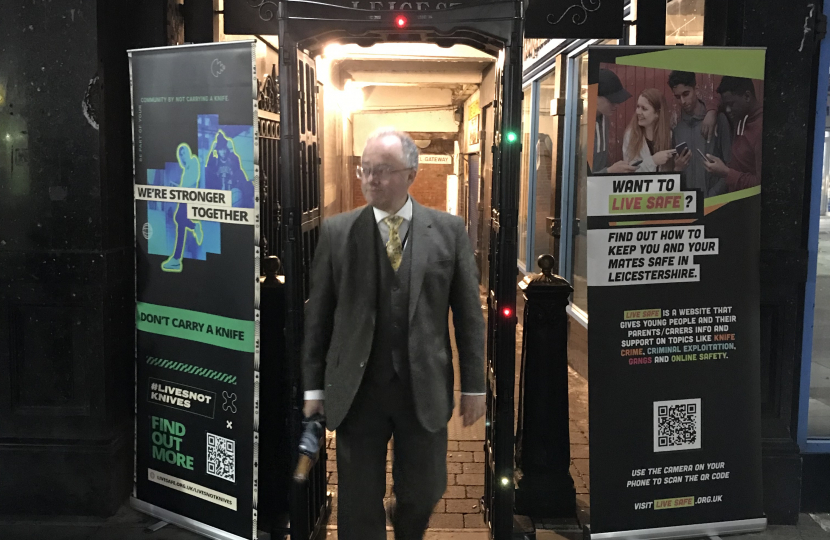
Police and Crime Commissioner Rupert Matthews has welcomed the success of joint action to crackdown on serious violence and knife crime and reduce incidents.
The Leicester, Leicestershire and Rutland PCC works collaboratively with Leicestershire Police's Violence and Complex Crime Unit's Prevention Team and the Violence Reduction Network (VRN) to prevent and reduce serious violence and knife crime across the city and two counties.
The Home Office confirmed in 2024 that serious violence in Leicester, Leicestershire and Rutland is reducing and the area was hailed for best practice in 2023 for its proactive approach.
The most recent figures show serious violence offences have fallen -12.1% while violence against the person offences have seen a -6.1% decrease.
Together, the partners use data, evidence and targeted work to change behaviour, funding activity in schools and other youth settings and working with vulnerable groups to improve safety and reduce knife-carrying.
Significant funding has been invested in projects that target young people at ‘reachable' moments in their journeys, in places where they are more likely to accept support, including A&E, police custody and on the streets in the places where they gather.
The PCC has also supported key changes within the force to deliver a more robust response to violent crime. Through Wider Offender Management, the force identifies those at greatest risk of harm from knife-carrying while officers are informed about habitual knife carriers so they can disrupt their activities and engage and divert them from offending further.
He also supports ‘hotspot' policing with partners through the Government's GRIP funding programme, using data to target enforcement activity in 18 locations across the force area against those offenders who pose the highest risk. This work includes joint problem-solving to improve environmental factors including CCTV coverage and lighting.
In collaboration with the VRN, the PCC launched the Community Fund: Diversion from Anti-Social Behaviour which saw the allocation of £200k to 12 community providers to deliver diversionary activities for children and young people aged 25 and under across LLR over a period of 24 months.
To support prevention, the agencies deliver Knife Crime Awareness - an education package delivered by Leicestershire Police covering what knife crime is, why people carry knives and where to access more information or to report. The force routinely reaches 10,000 students a year through the scheme.
In other work, the partners fund awareness campaigns including Lives Not Knives - a universal campaign that runs all year round to discourage knife carrying among young people - and Live Safe - an online resource for young people and their parents/carers on issues relating to young people's safety.
Mr Matthews said: "Serious violence and knife crime tears families and communities apart. We know these issues aren't going to disappear overnight. This is why we have put our minds and resources together to deal with the complex and multi-layered issues that drive some young people down the wrong path where they can be harmed or harm others.
"Every life lost is a tragedy. By using evidence and data, we are targeting our work towards the people and places that need it most - and what we are doing is really working.
"There is much more to do, but Leicestershire is already held as a beacon of good practice nationally and we will continue to learn lessons from what we do well and what we could do better to build on this platform to ensure many more young people get the urgent help they need."
A new Serious Violence Prevention Strategy is now in place setting out the collective action that partners will take over the next five years to further reduce serious violence under the responsibilities of the Government's Serious Violence Duty.
Other achievements include:
- The production of a Strategic Needs Assessment each year by the VRN to understand the types, distribution and extend of serious violence locally and decide how, where and with whom violence is reduced and prevented.
- Leicestershire Police supports the national Op Sceptre campaign twice a year which involves the delivering of educational input into schools as well as stepping up police-led prevention and enforcement activity including knife arches and test purchasing in relation to the illegal sale of knives to under 18s.
- As part of its education provision, the VRN runs a Mentors in Violence Prevention (MVP) peer-led and bystander programme in secondary schools. MVP trains students as mentors and equips the with the confidence, knowledge and skills needed to identify and speak out against bulling, abusive behaviour and violence including knife crime. It also tackles the beliefs and attitudes that underpin violence.
- The VRN runs a Violence Intervention Project (VIP) providing timely and tailored support to young people attending A&E or custody. Support workers engage with young people at ‘reachable' moments and offer support to assist recovery and address pressing issues such as safety and emotional well-being.
- The VRN runs the focused deterrence project, the Phoenix Programme, funded by the Youth Endowment Fund which offers an age-appropriate package of support focused around hope, opportunity and connection. The project is delivered through a multi-agency team which includes community navigators with lived experience of crime and violence.
Police and Crime Commissioner Rupert Matthews has welcomed the success of joint action to crackdown on serious violence and knife crime and reduce incidents.
The Leicester, Leicestershire and Rutland PCC works collaboratively with Leicestershire Police's Violence and Complex Crime Unit's Prevention Team and the Violence Reduction Network (VRN) to prevent and reduce serious violence and knife crime across the city and two counties.
The Home Office confirmed in 2024 that serious violence in Leicester, Leicestershire and Rutland is reducing and the area was hailed for best practice in 2023 for its proactive approach.
The most recent figures show serious violence offences have fallen -12.1% while violence against the person offences have seen a -6.1% decrease.
Together, the partners use data, evidence and targeted work to change behaviour, funding activity in schools and other youth settings and working with vulnerable groups to improve safety and reduce knife-carrying.
Significant funding has been invested in projects that target young people at ‘reachable' moments in their journeys, in places where they are more likely to accept support, including A&E, police custody and on the streets in the places where they gather.
The PCC has also supported key changes within the force to deliver a more robust response to violent crime. Through Wider Offender Management, the force identifies those at greatest risk of harm from knife-carrying while officers are informed about habitual knife carriers so they can disrupt their activities and engage and divert them from offending further.
He also supports ‘hotspot' policing with partners through the Government's GRIP funding programme, using data to target enforcement activity in 18 locations across the force area against those offenders who pose the highest risk. This work includes joint problem-solving to improve environmental factors including CCTV coverage and lighting.
In collaboration with the VRN, the PCC launched the Community Fund: Diversion from Anti-Social Behaviour which saw the allocation of £200k to 12 community providers to deliver diversionary activities for children and young people aged 25 and under across LLR over a period of 24 months.
To support prevention, the agencies deliver Knife Crime Awareness - an education package delivered by Leicestershire Police covering what knife crime is, why people carry knives and where to access more information or to report. The force routinely reaches 10,000 students a year through the scheme.
In other work, the partners fund awareness campaigns including Lives Not Knives - a universal campaign that runs all year round to discourage knife carrying among young people - and Live Safe - an online resource for young people and their parents/carers on issues relating to young people's safety.
Mr Matthews said: "Serious violence and knife crime tears families and communities apart. We know these issues aren't going to disappear overnight. This is why we have put our minds and resources together to deal with the complex and multi-layered issues that drive some young people down the wrong path where they can be harmed or harm others.
"Every life lost is a tragedy. By using evidence and data, we are targeting our work towards the people and places that need it most - and what we are doing is really working.
"There is much more to do, but Leicestershire is already held as a beacon of good practice nationally and we will continue to learn lessons from what we do well and what we could do better to build on this platform to ensure many more young people get the urgent help they need."
A new Serious Violence Prevention Strategy is now in place setting out the collective action that partners will take over the next five years to further reduce serious violence under the responsibilities of the Government's Serious Violence Duty.
Other achievements include:
· The production of a Strategic Needs Assessment each year by the VRN to understand the types, distribution and extend of serious violence locally and decide how, where and with whom violence is reduced and prevented.
· Leicestershire Police supports the national Op Sceptre campaign twice a year which involves the delivering of educational input into schools as well as stepping up police-led prevention and enforcement activity including knife arches and test purchasing in relation to the illegal sale of knives to under 18s.
· As part of its education provision, the VRN runs a Mentors in Violence Prevention (MVP) peer-led and bystander programme in secondary schools. MVP trains students as mentors and equips the with the confidence, knowledge and skills needed to identify and speak out against bulling, abusive behaviour and violence including knife crime. It also tackles the beliefs and attitudes that underpin violence.
· The VRN runs a Violence Intervention Project (VIP) providing timely and tailored support to young people attending A&E or custody. Support workers engage with young people at ‘reachable' moments and offer support to assist recovery and address pressing issues such as safety and emotional well-being.
· The VRN runs the focused deterrence project, the Phoenix Programme, funded by the Youth Endowment Fund which offers an age-appropriate package of support focused around hope, opportunity and connection. The project is delivered through a multi-agency team which includes community navigators with lived experience of crime and violence.
Photo - Rupert Matthews passes through a knife arch in Leicester city centre


